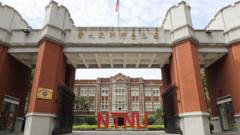Taiwan's political landscape is on edge as citizens prepare for a groundbreaking vote aimed at recalling over 30 lawmakers accused of siding with China. This unprecedented initiative, known as the "Great Recall," reflects deep societal divisions and could significantly shift the balance of power in the Legislative Yuan.
Taiwan's Great Recall Vote: A Challenge to 'Pro-China' Lawmakers

Taiwan's Great Recall Vote: A Challenge to 'Pro-China' Lawmakers
Amid rising tensions, Taiwan embarks on a historic vote aiming to remove legislators deemed too compliant with China.
In an unprecedented move, Taiwan is on the brink of a transformative vote challenging more than 30 lawmakers accused of being too sympathetic to China. The Great Recall initiative has sparked heated debates and significant public mobilization, with both proponents and opponents claiming to defend Taiwan's democracy. This movement gained momentum after the recent elections, where the Democratic Progressive Party (DPP) triumphed in the presidential race but faced a legislative stalemate.
Tensions mounted after the main opposition party, the Kuomintang, joined forces with the Taiwan People's Party and independents, using their parliamentary power to block DPP initiatives. This maneuver raised alarms among some Taiwanese, who perceived it as a strategy to undermine the DPP and fortify the opposition's hold on the legislature.
The Bluebird movement emerged in May as ongoing protests rallied citizens against the Kuomintang, which has historically been viewed as pro-China. Activists circulated petitions to target specific lawmakers for recall, escalating the confrontation. In a counter-response, Kuomintang supporters initiated their own recall efforts against DPP members.
Voting will take place this Saturday across 24 districts, where citizens will decide on the fate of lawmakers through a simple yes or no ballot. For a recall to succeed, participation is crucial—at least 25% voter turnout alongside a majority yes vote is necessary. Following this vote, another round will occur in August for additional targeted legislators.
As civic groups intensively campaign, mobilizing support through social media and grassroots efforts, the Kuomintang has countered with rallies promoting a no vote against the recalls. They allege that the DPP is orchestrating the Great Recall to overturn electoral outcomes.
Initially, the DPP distanced itself from the movement but later aligned with it, with presidential candidate William Lai urging party members to support the recall groups. The ongoing situation has provoked reactions from Beijing, which accused the DPP of suppressing dissent while masquerading as democratic.
As Taiwan stands at this pivotal juncture, the outcome of the Great Recall could dramatically reshape its political dynamics and influence its stance toward China.
Tensions mounted after the main opposition party, the Kuomintang, joined forces with the Taiwan People's Party and independents, using their parliamentary power to block DPP initiatives. This maneuver raised alarms among some Taiwanese, who perceived it as a strategy to undermine the DPP and fortify the opposition's hold on the legislature.
The Bluebird movement emerged in May as ongoing protests rallied citizens against the Kuomintang, which has historically been viewed as pro-China. Activists circulated petitions to target specific lawmakers for recall, escalating the confrontation. In a counter-response, Kuomintang supporters initiated their own recall efforts against DPP members.
Voting will take place this Saturday across 24 districts, where citizens will decide on the fate of lawmakers through a simple yes or no ballot. For a recall to succeed, participation is crucial—at least 25% voter turnout alongside a majority yes vote is necessary. Following this vote, another round will occur in August for additional targeted legislators.
As civic groups intensively campaign, mobilizing support through social media and grassroots efforts, the Kuomintang has countered with rallies promoting a no vote against the recalls. They allege that the DPP is orchestrating the Great Recall to overturn electoral outcomes.
Initially, the DPP distanced itself from the movement but later aligned with it, with presidential candidate William Lai urging party members to support the recall groups. The ongoing situation has provoked reactions from Beijing, which accused the DPP of suppressing dissent while masquerading as democratic.
As Taiwan stands at this pivotal juncture, the outcome of the Great Recall could dramatically reshape its political dynamics and influence its stance toward China.




















